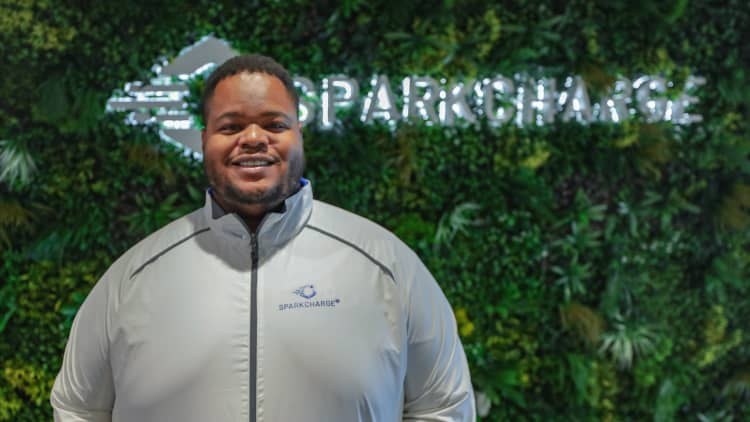If you're on the fence about electric vehicles, Josh Aviv wants to alleviate one of your top concerns: "range anxiety."
That's the nervous feeling EV owners or prospective buyers get when they're concerned that their electric vehicle won't have enough battery power to reach its destination. But what if, instead of searching for a charging station, you could summon someone to meet you and charge your car wherever you are?
That's the idea behind SparkCharge, Aviv's Somerville, Massachusetts-based startup that launched in 2017. The company makes portable battery charging units that can be delivered to your doorstep, or wherever your car needs a charge.
"You can select the time, the place, choose your vehicle, how much range you want, and with the push of a button it gets brought to you," Aviv, the company's 30-year-old co-founder and CEO, tells CNBC Make It. "So, the same way that you would order food from Uber Eats or GrubHub is the same way that you can now have energy brought to your vehicle."
There are currently more electric vehicles on the road than ever before — with a record 6.6 million sold in 2021, double the previous year's total.
But range anxiety and concerns about local charging station availability are still the top two factors keeping more people from jumping on the EV bandwagon, according to a May 2022 report from Ernst and Young that surveyed more than 13,000 people around the world.
Aviv's idea has generated plenty of support. SparkCharge has raised roughly $30 million from investors like Mark Cuban, Tale Venture Partners and rapper Pusha-T. In 2020, Aviv pitched SparkCharge on ABC's "Shark Tank," where Cuban and Lori Greiner teamed up to commit $1 million for a 10% equity stake in the company.
The investments currently value SparkCharge at about $110 million, Aviv says. The company has already secured partnerships with major brands like Kia Motors, Hertz and Uber — and is on track to bring in $10 million in revenue this year, Aviv adds.
How it works
SparkCharge subscribers across 121 U.S. cities can schedule a charging appointment at the click of a button.
If you don't subscribe, you can still request a single one-off charge for $39.99, which the company promises will be delivered within 90 minutes.
Either way, a technician brings portable Roadie charging units to your car, whether it's parked at your home, your office or nearly anywhere else. The service can't be called if your car dies on the side of a highway, according to the FAQ page for SparkCharge's app.
You don't even have to meet the technician at your car, so long as they can access the car's charging port.
The Roadie units can deliver up to 100 miles of added driving range in under two hours, charging at a rate of about one mile per minute, Aviv says. The service can only charge your car to 80% capacity, so SparkCharge is banking on the convenience being worth the trade-off.
Subscription packages range from $5 to $30 per month. At the least expensive level, you pay $0.69 per kilowatt-hour (kWh). That price goes down to $0.51 per kWh with the most expensive subscription.
The average cost of 16 gallons of gas is currently nearly $50, according to AAA. Charging a 40 kWh EV battery to 80% capacity would cost as much as $22.08, at SparkCharge's highest advertised rate.
'We can blanket that entire city with energy'
Aviv got the idea for mobile EV charging in 2014, when he was an economics major at Syracuse University. During an environmental economics class, his professor announced to the room: 'If you want to solve a huge problem for the world, solve the problem of infrastructure for electric vehicles,'" Aviv recalls.
The professor invited any students interested in taking him up on the challenge to meet after class.
"I was the only person to show up and meet with him," Aviv says.
The idea for a portable charging system eventually landed Aviv a spot in Syracuse's Blackstone LaunchPad innovation program. In 2017 he received his first financial support, winning $4,500 in a college startup pitch contest to build prototypes of what would become the Roadie charging units.
A year later, SparkCharge won $1 million in the annual pitch competition hosted by tech accelerator 43North.
The company spent the next few years perfecting designs for the Roadie, beginning deliveries in mid-2021. This year, it says it's on track to deliver more than 1 million miles worth of battery power to customers.
Aviv hopes to to expand to more cities — including San Diego, Phoenix and New York City — in 2023. The company's mobility helps it set up a presence in a new city in a matter of weeks, he adds.
"We can be up and running in a city in under 14 days," Aviv says. "We can blanket that entire city with energy."
This story has been updated to reflect that non-subscribers can request a one-off SparkCharge appointment for $39.99.
Disclosure: CNBC owns the exclusive off-network cable rights to "Shark Tank."
Sign up now: Get smarter about your money and career with our weekly newsletter



